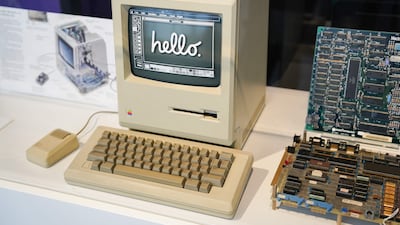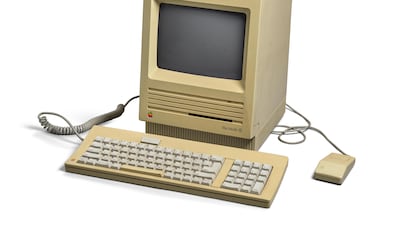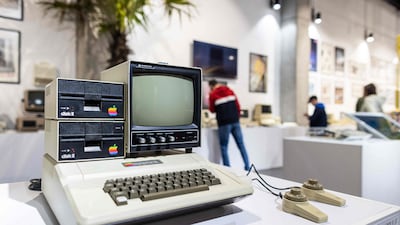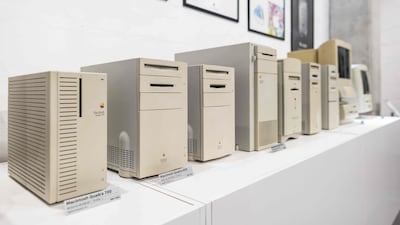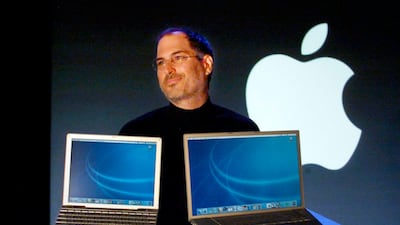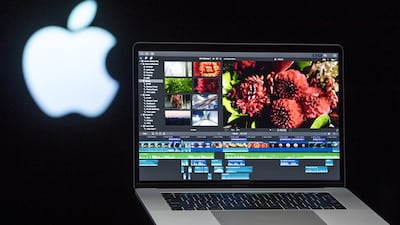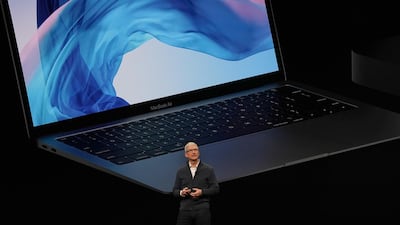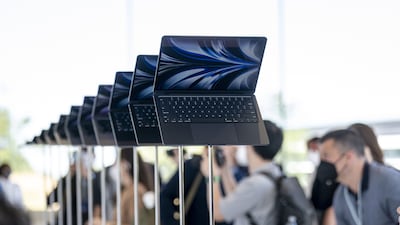Apple has announced that Apple Intelligence, its long-expected entry into the realm of generative artificial intelligence, will soon be introduced across its ecosystem.
Defined as “personal intelligence”, the company’s first take on generative AI aims to make “your most personal products more useful and delightful”, chief executive Tim Cook said at the Worldwide Developers Conference at Apple's headquarters in Cupertino, California, on Monday.
To reassure users that their data is safe as the company introduces generative AI across its products, Apple emphasised that the innovation has been built with a focus on safety and delivering highly personalised experiences.
“Most importantly, it has to understand you and be grounded in your personal context, like your routine, your relationships, your communications and more,” Mr Cook said.
“And of course, it has to be built with privacy from the ground up together. All of this goes beyond artificial intelligence. It’s personal intelligence and it’s the next big step for Apple.”
The new technology will be integrated into the company’s latest operating systems for iPhones, iPads and Macs.
It will harness the power of in-house silicon chips to understand and create language and images, in addition to taking action across apps.
Powered by Apple Intelligence, the company’s virtual assistant Siri will be integrated deep into the system experience, Apple said.
With advanced language understanding, Siri will become more natural, more contextually relevant and more personal, with the ability to simplify and accelerate everyday tasks.
Apple’s AI plans fail to push stock
Despite the much-awaited AI announcements, the company's stock showed little movement.

Its share price dropped 1.91 per cent to $193.12 at market close on Monday, giving the company a market value of $2.96 trillion. It dropped 0.26 per cent to $192.61 in after-market trading.
But industry analysts are optimistic about the company’s future.
Integration of AI across Apple's diverse range of offerings is gaining significant momentum, Thomas Monteiro, senior analyst at Investing.com, told The National.
“This was not only evident in the multitude of AI features in the final product, but also in the company's strategic plan to leverage its vast consumer base … a trend that has defined Apple's approach over the past decade,” Mr Monteiro said.
“Despite investors treating this as a sell-the-news type of event due to the lack of significant breaking announcements, looking from a broader perspective, several positive points indicate that Tim Cook is shifting the company in the right direction again.”
Ipek Ozkardeskaya, a senior analyst at Swissquote Bank, said Apple has lagged behind its competitors in the early development and introduction of AI technology.
Unlike Microsoft and Google, which have released advanced AI models, Apple has yet to present a clear and strong AI strategy.
“Many investors don’t see Apple as a cutting-edge technology company but rather as a luxury brand that sells millions of hardware that could be home to any reasonably appreciated AI model,” Ms Ozkardeskaya wrote in a note.
“But everyone agrees that Apple should develop their AI offering fast, and this week’s WWDC is a line in the sand.”
Apple’s long-awaited partnership with OpenAI
Apple also announced at WWDC that it is joining forces with Microsoft-backed OpenAI, the company behind ChatGPT, to integrate its generative AI tool into Siri.
ChatGPT will be available free of charge in iOS 18 and macOS Sequoia – the next version of the desktop operating system – later this year.
Paying ChatGPT users will be able to link their accounts to gain access to OpenAI’s advanced features within Apple’s operating systems.
“Apple shares our commitment to safety and innovation, and this partnership aligns with OpenAI’s mission to make advanced AI accessible to everyone,” OpenAI chief executive Sam Altman said in a statement shared with The Verge.
First look at iOS 18 for iPhones
Apple also unveiled its latest operating system for iPhones, iOS 18, which comes with various personalisation options, the biggest redesign ever of the Photos app and new ways to manage the mail inbox.
Users will be able to arrange apps in any open space on the home screen, customise the buttons at the bottom of the lock screen, quickly gain access to more controls in the control centre and automatically organise photo libraries in a single view.
Powered by the same technology as existing iPhones, users can now communicate over satellite in the messages app in the absence of mobile or Wi-Fi connection.
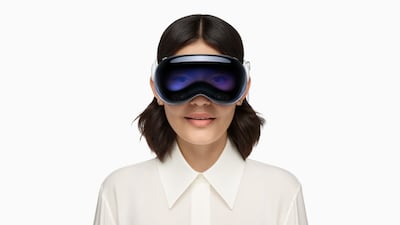
“It is a huge release with incredible features … there are so many benefits for everyone,” said Craig Federighi, Apple’s senior vice president of software engineering.
The developer beta, or trial, of iOS 18 is now available, while a public beta will be available next month. The free software update for iPhone X and later models will be available in September or October.
Apple Vision Pro expands to new markets
Apple Vision Pro, the company's first major product release since the Watch in 2015, will be made available in new countries and regions, with pre-orders for China, Hong Kong Japan and Singapore starting on Thursday.
Customers in Australia, Canada, France, Germany and the UK can order the device, which went on sale in the US in February, from June 28.
Priced at $3,499 (Dh12,850), the device marks Apple’s arrival into the world of computers that can be worn on the face.
It has been described by Mr Cook as a new era of “spatial computing” – a melding of virtual, augmented and mixed reality.
New software updates for iPads, Macs, Watch, TV and Vision Pro
Apple also unveiled a first look at its operating systems for other products.
It previewed watchOS 11 for Apple Watch, introducing the Vitals app for key health metrics and new fitness tracking features.
It offers enhanced personalisation and connectivity options, including support for pregnant users and new gesture controls.
And iPadOS 18 was unveiled, featuring enhanced handwriting tools for the Apple Pencil, and a redesigned Photos app.
The macOS Sequoia brings new functionalities such as iPhone mirroring, a new Passwords app and gaming improvements.
Meanwhile, tvOS 18 offers new features for improved entertainment experiences, while visionOS 2 for Vision Pro introduces spatial photo creation and new hand gestures, along with enhanced developer tools for creating spatial apps.

